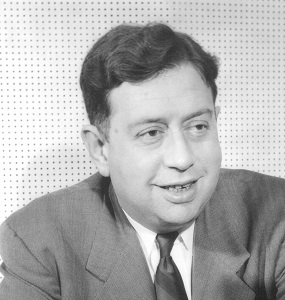Print HOF
Duggan, Martin
Martin Duggan – 2006
Martin Duggan’s career in St. Louis media spans some 60 years but it’s as a journalist that St. Louis first came to know Duggan. He calls his stint as the news editor of the St. Louis Globe-Democrat his favorite job, but it was at the helm of the paper’s editorial page from 1972 to 1984 that generations of St. Louisans remember him best. For years, he remained the conservative conscience of the city and region. Duggan left the Globe in 1984. In 1986, Duggan was inspired to create Donnybrook after watching Sunday morning television shows such as The McLaughlin Group. Duggan saw his role on the show less as host or moderator, and more of provocateur. It should come as no surprise to fans of the show that the man who rode herd on the rowdy panel was a Marine during World War II. Duggan has said, “Well, I’m a conservative, but I’ve got more friends among the Democrats than the Republicans. They’re friendly people, for one thing, and there are more of them.”
